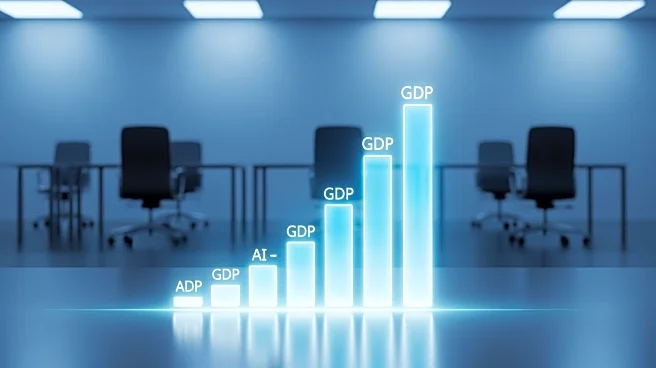What's Happening?
The U.S. economy is experiencing a phenomenon termed 'jobless growth,' where GDP growth is robust but job creation remains modest. This trend is largely driven by AI-related spending, which accounted for
92% of GDP growth in the first half of 2025, according to economists David Mericle and Pierfrancesco Mei. Despite the economic growth, job postings, especially for entry-level positions, have decreased, indicating a potential barrier for new entrants into the job market. The current economic landscape suggests that while AI adoption is boosting productivity, it may also be contributing to a slowdown in hiring, particularly for roles that traditionally serve as stepping stones to senior positions.
Why It's Important?
The shift towards AI-driven growth without corresponding job creation poses significant challenges for the U.S. labor market. As AI continues to be integrated into business operations, the demand for human labor, particularly in entry-level positions, may decline. This could lead to a skills gap, where there are insufficient opportunities for workers to gain the experience needed for senior roles. The reliance on AI for economic growth also raises concerns about economic stability, as a downturn in AI investments could have severe repercussions. The situation underscores the need for policies that balance technological advancement with job creation to ensure sustainable economic growth.
What's Next?
Economists warn that the full impact of AI on the labor market may not be evident until a recession occurs. As AI investments continue to drive economic growth, there is a risk that over-reliance on this sector could lead to vulnerabilities similar to those seen in past economic bubbles. Policymakers and business leaders may need to consider strategies to mitigate potential negative impacts on employment, such as investing in workforce retraining programs and encouraging sectors that can provide new job opportunities.
Beyond the Headlines
The current economic trend highlights a broader societal challenge: the need to adapt to technological advancements while ensuring equitable economic opportunities. The potential for AI to displace jobs raises ethical questions about the role of technology in society and the responsibility of businesses to support their workforce. Long-term, the integration of AI could lead to significant shifts in the labor market, necessitating a reevaluation of education and training systems to prepare future generations for a changing job landscape.










